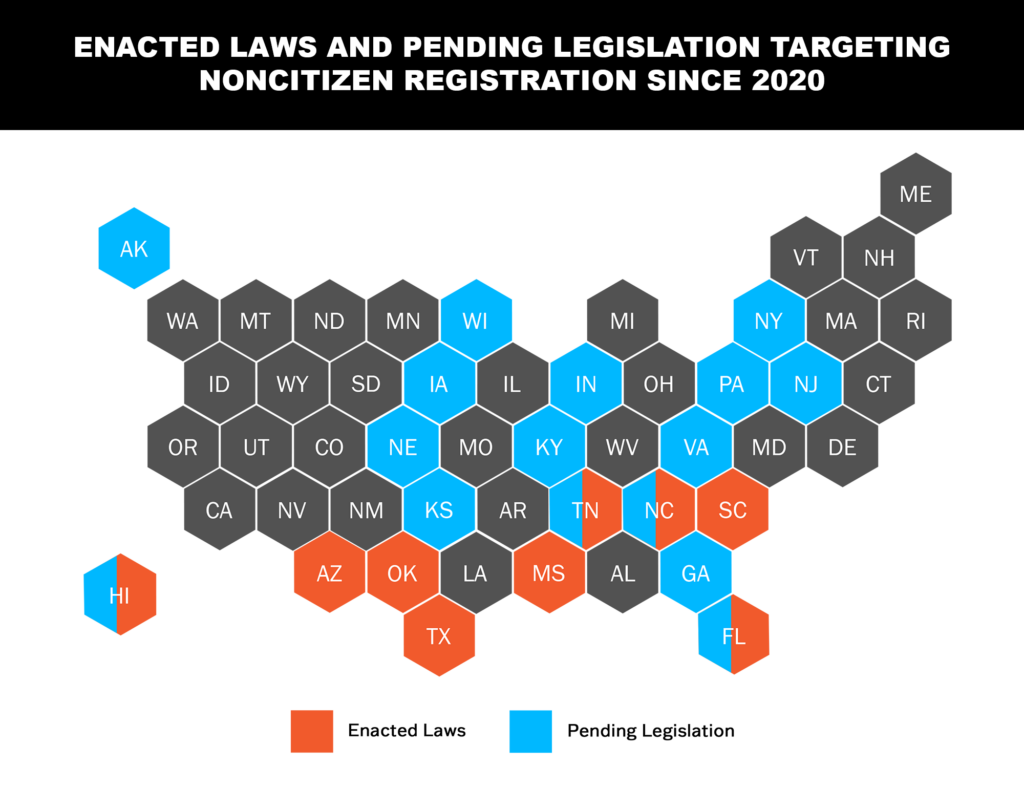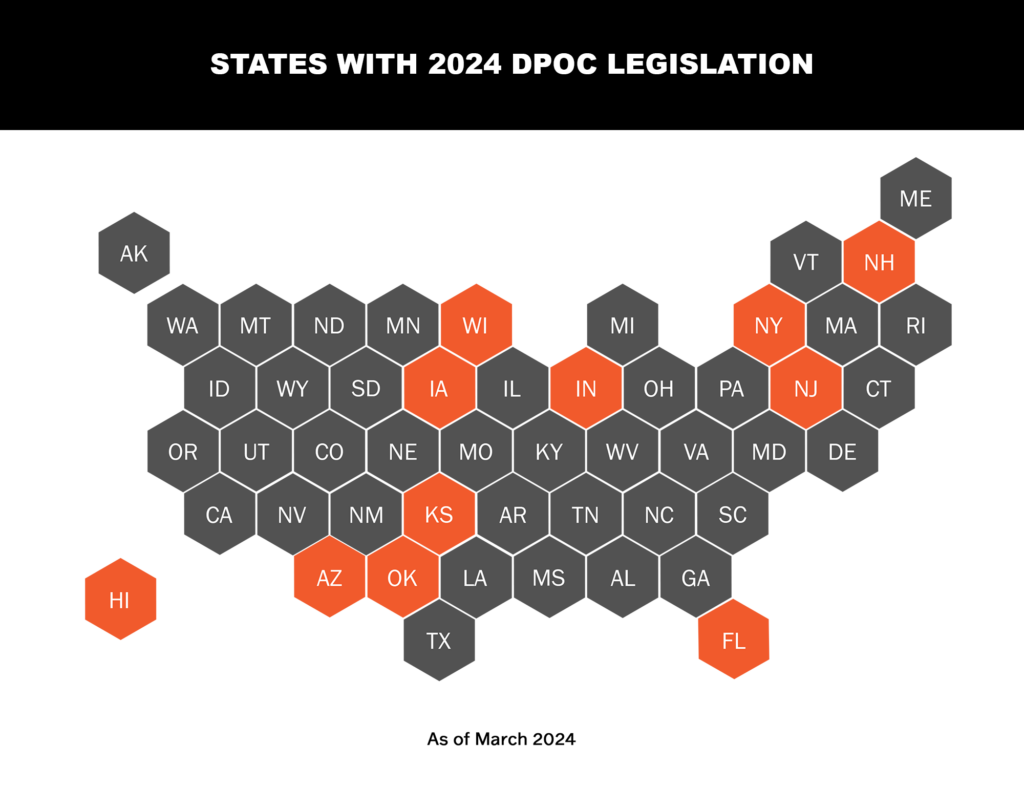Report
The Truth about False Claims of Noncitizen Voting
About This Analysis
Only U.S. citizens may vote in federal and statewide elections. Potential voters must attest, under penalty of perjury, that they are U.S. citizens in order to register to vote – and states take additional steps to ensure that noncitizens are not on their voter registration lists. Although there is no evidence that the current systems are not working, or that noncitizen voting is a problem, some states are currently considering – and adopting – new laws that go too far, risking purges of U.S. citizens from their voter registration lists.
On top of the disenfranchisement of eligible American voters, these new policies have resulted in both court orders blocking their implementation and resignations by top election officials. This analysis provides greater detail around current law – and new legislation under consideration – related to citizenship and voting in the United States.
There’s Little Evidence of Noncitizen Voting in the U.S. Today
Before addressing the current law and legislation around noncitizen voting, it is worth noting that there is currently no empirical evidence suggesting noncitizen voting is an issue facing U.S. elections today. In fact, efforts to identify noncitizen voting in U.S. elections have repeatedly failed. For example, in Georgia, a 2022 audit of the state’s voter rolls found that just 1,600 noncitizens attempted to register to vote over the 25 year period from from 1997-2022 – and none were successful. In another study conducted across a sample of 42 jurisdictions accounting for more than 23 million votes in the 2016 general election, election officials identified just 30 incidents of potential noncitizen voting.
Current Law Prohibits and Prevents Noncitizen Voting
Voter registration forms require each potential voter to swear, under penalty of perjury, that they are a U.S. citizen who is eligible to vote. It is a felony offense for a noncitizen to falsely claim to be a citizen on a voter registration form – punishable by a prison time, a hefty fine, and deportation. Personal attestation under penalty of perjury is sufficient for other legal procedures, such as signing marriage licenses and deeds.
Election officials in every state regularly work to ensure voter rolls are accurate and up-to-date. Generally, states have systematic processes whereby state and local election officials consult specific data sources to determine whether any voters currently on the voter list are ineligible for reasons such as death, felony conviction, change of address, or lack of U.S. citizenship.
Some states take particular care to ensure noncitizens are not on voter registration lists by comparing these lists to DMV records and jury duty exclusion lists. Some states – including Colorado, Georgia, and Texas – compare people on the voter registration list to DMV records to ensure that voters who recently used a form of residency documentation that indicates noncitizenship (such a resident alien card) are not registered to vote. And in other states – such as Arizona, Georgia, North Carolina, and Texas – election officials compare voter registration records to records of people who are excused from jury duty for stating that they are not citizens.
Some State Policies Risk Disenfranchising Eligible American Citizens
When comparing voter lists to DMV and jury exclusion data, adequate safeguards are essential to ensure eligible voters are not incorrectly removed. When laws and policies lack adequate protections, these comparisons can – and have – led to “false positives” that wrongfully identify eligible individuals for removal.
Failure to use sufficient matching criteria can lead to removal of eligible voters who have the same name as a noncitizen. It is critical that election officials ensure the person they are removing from the voter registration list is the same person who has been identified as a noncitizen through DMV or jury duty records. This requires the use of several different matching criteria, such as full name, date of birth, full address (including apartment number), and driver’s license or other identifying number.
Using outdated data has led to the incorrect identification of eligible U.S. citizens for removal. In 2019, Texas sent letters to tens of thousands of naturalized citizens, threatening to remove them from the voter registration list based on outdated DMV records. Litigation ensued, a federal court blocked Texas from carrying out the purge effort, and the secretary of state resigned over the near-disenfranchisement of tens of thousands of U.S. citizens. At the time there were no safeguards in Texas law, so voters who were not citizens at the time of their interaction with the DMV – but who later became naturalized citizens – were targeted for removal. Texas has since changed its law to ensure that voters are only identified for removal if the DMV data is from an interaction that occurred after they registered to vote.
Recent Years See Legislation Designed to Prevent Noncitizen Voting
Since the 2020 election, nine states have enacted new laws aiming to identify and remove noncitizens from their voter rolls, and such legislation is currently active in 16 states. Some of these laws are concerning in their lack of adequate safeguards to protect against the removal of eligible U.S. citizens from the voter rolls. For example, in 2023, Mississippi enacted a law that requires election officials to reference potentially-stale data that does not include matching criteria sufficient to ensure they are removing the correct person. And a fast-moving bill is primed to set up Indiana to make a mistake similar to the one Texas made in 2019. The bill, which has already passed both chambers of the legislature, does not protect against the use of outdated DMV data, risking the removal of naturalized U.S. citizens.
Enacted laws and pending legislation targeting noncitizen registration since 2020
On the other hand, a 2023 Florida law adheres more closely to best practices for this approach to list maintenance – it requires election officials to reference up-to-date data that includes multiple types of identifying information to avoid the removal of eligible voters.

Some State Laws Targeting Noncitizen Voting Violate Federal Statute and Constitutional Law
The federal National Voter Registration Act establishes that states must require voter registration applicants to attest, under penalty of law, that they meet each eligibility requirement to vote, including U.S. citizenship. Because this process applies to federal elections, states typically apply this process to registration for state and local elections as well.
However, some states have tried to implement additional requirements for registrants to prove U.S. citizenship – and federal courts have blocked many of these efforts. For example, Arizona voters approved a ballot measure in 2004 to require registrants to provide documentary proof of citizenship (DPOC), such as a birth certificate or naturalization paperwork, in order to have their voter registration approved. The U.S. Supreme Court went on to block enforcement of this provision for federal elections – holding that Congress has the primary authority to set the rules for federal elections under the Constitution.[1] Since this ruling, Arizona has operated a bifurcated voter registration system – meaning voters who wish to participate in state or local elections must provide DPOC, while those who only wish to participate in federal elections can attest to their citizenship under penalty of law.
Seeking to test the limits of the Supreme Court ruling, the Arizona legislature recently passed a law in 2022 imposing new restrictions, including prohibiting voters from participating in federal presidential elections – and from voting by mail in federal elections – unless they provide documentary proof of citizenship. On February 29, a federal district court issued its final ruling concluding that these provisions of the Arizona law and several others violate federal laws and may not be enforced.
Other states have enacted similar laws requiring DPOC for voter registration — each have met identical fates in court. Kansas, for example, passed legislation in 2015 to require DPOC for voter registration, but the federal 10th Circuit Court of Appeals held that the law was unconstitutional.[2] The U.S. Supreme Court chose not to review the 10th Circuit’s ruling.
States with 2024 DPOC Legislation

Today, 49 states require that potential voters attest to their voting eligibility (including citizenship), under penalty of perjury, to register to vote in all elections. Arizona is the only state that requires those seeking to vote in state or local elections to provide documentary proof of citizenship. However, as of March 2024, 11 states are considering legislation that would institute a DPOC requirement. Given prior court rulings regarding similar proposals in Arizona and Kansas, the constitutionality of these proposals is questionable.
[1] Arizona v. Inter Tribal Council of Ariz, Inc. (ITCA), 570 U.S. 1 (2013).
[2] Fish v. Schwab, 957 F.3d 1105 (10th Cir. 2020).
Voting Rights Lab is a nonpartisan, 501(c)(3) nonprofit organization that brings state policy and legislative expertise to the fight for voting rights. This analysis is powered by Voting Rights Lab’s State Voting Rights Tracker, the most comprehensive database of state level election legislation.